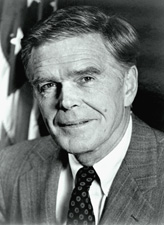Floyd Kirk Haskell (February 7, 1916 – August 25, 1998) was an American lawyer and politician. A member of the Democratic Party, he served as a U.S. Senator from Colorado from 1973 to 1979.
Floyd Haskell | |
|---|---|
 | |
| United States Senator from Colorado | |
| In office January 3, 1973 – January 3, 1979 | |
| Preceded by | Gordon Allott |
| Succeeded by | William L. Armstrong |
| Member of the Colorado House of Representatives | |
| In office 1965-1969 | |
| Personal details | |
| Born | Floyd Kirk Haskell February 7, 1916 Morristown, New Jersey, U.S. |
| Died | August 25, 1998 (aged 82) Washington, D.C., U.S. |
| Political party | Republican (before 1970) Democratic (1970–1998) |
| Spouse(s) | Eileen Nicoll (1941-1976; divorced; 3 children) Nina Totenberg (1979-1998; his death) |
| Alma mater | Harvard University |
| Military service | |
| Allegiance | |
| Branch/service | |
| Years of service | 1941-1945 |
| Rank | Major |
| Battles/wars | World War II |
Early life and career edit
Floyd Haskell was born in Morristown, New Jersey, to Edward Kirk and Gladys (née Clarkson) Haskell.[1] His father was an investment banker.[2] He attended Harvard College, where he received a Bachelor of Arts degree in 1937.[3] During college, he played on the football, rugby, and soccer teams, later developing as a tennis player, and was president of the Rocky Mountain Club.[4][5][6] He received a law degree from Harvard Law School in 1941.[3] That same year he married Eileen Nicoll, to whom he remained married until their divorce in 1976; they had three daughters, Ione, Evelyn, and Pamela.[7]
During World War II, Haskell served in the U.S. Army from 1941 to 1945, seeing action in Asia, viewing the immediate aftermath of Hiroshima, and reaching the rank of major.[3] He was awarded a Bronze Star Medal for his intelligence work.[7] Following his military service, he was admitted to the bar in 1946 and moved to Denver, Colorado, where he worked as a tax lawyer.[2]
In 1964, Haskell was elected as a Republican to the Colorado House of Representatives from Arapahoe County, serving until 1969.[3] As a state legislator, he became assistant majority leader in 1967 and also served as chairman of the House Judiciary Committee and a member of the House Education and Finance Committees.[7] In 1970, he left the Republican Party and became a Democrat in protest of President Richard Nixon's invasion of Cambodia.[2]
U.S. Senate edit
In 1972, Haskell decided to challenge three-term Republican incumbent Gordon L. Allott for a seat in the U.S. Senate. He defeated Anthony Vollack in the Democratic primary.[8] In the general election, he narrowly won[9][10] a four-way race between Allott[11] and candidates from the Raza Unida Party[12] and the American Independent Party,[13] receiving only 49% of the vote.[10][14] He defeated his closest competitor, Senator Allott, by less than 10,000 votes while President Nixon carried Colorado by over 267,000 votes.[10]
Haskell was sworn into the Senate on January 3, 1973.[3] He served as a member of the Senate Finance and Energy and Natural Resources Committees, where he earned a reputation as a tax reformer and advocate for the environment.[2] He supported the historic Alaska Lands legislation and regulation of auto emissions, the Panama Canal treaties, and alternative sources of energy.[15] In 1978, lacking campaign funds and media acumen, he was defeated for re-election by Congressman William L. Armstrong, the first in Colorado to raise over a million dollars, losing by a landslide margin of 59%-40%.[16]
Later life and death edit
After his Senate career, Haskell established his residence in Washington, D.C., where he practiced law before joining Common Cause and a bipartisan group of retired lawmakers calling for campaign finance reform and an end to congressional gridlock.[15] In 1979, he married Nina Totenberg, the legal affairs correspondent for National Public Radio; they remained married until his death in 1998.[7]
Haskell suffered a cerebral hemorrhage in 1994 after falling on ice near his home in Washington.[15] He died of pneumonia four years later, at age 82, while returning from a vacation in Maine with his wife.[2]
References edit
- ^ "Unkelbach, Evelyn Cary". Hartford Courant. March 25, 2005.
- ^ a b c d e Alvarez, Lizette (August 26, 1998). "Floyd Haskell, 82, Ex-Senator From Colorado". The New York Times.
- ^ a b c d e "HASKELL, Floyd Kirk, (1916 - 1998)". Biographical Directory of the United States Congress.
- ^ "CRIMSON SOCCER TEAM TREKS TO JUNGLELAND". The Harvard Crimson. November 9, 1935.
- ^ "Listing of Harvard Clubs". The Harvard Crimson. June 21, 1951.
- ^ "Lining Them Up". The Harvard Crimson. October 22, 1935.
- ^ a b c d "MEMORIALIZING FORMER UNITED STATES SENATOR AND STATE REPRESENTATIVE FLOYD K. HASKELL". Colorado General Assembly. Archived from the original on September 8, 2005. Retrieved January 10, 2012.
- ^ Rosenthal, Jack (September 10, 1972). "Primary Season Stretches On, With 9 More Tuesday". The New York Times.
- ^ 457,545
- ^ a b c "Statistics of the Presidential and Congressional Election of November 7, 1972" (PDF). Clerk of the United States House of Representatives.
- ^ 447,957
- ^ 13,228
- ^ 7,353
- ^ "United States Congressional Elections 1972 - Colorado". The Elections Geek. Retrieved October 12, 2018.
- ^ a b c "Floyd Haskell Dies". The Washington Post. August 26, 1998.
- ^ "Statistics of the Congressional Election of November 7, 1978" (PDF). Clerk of the United States House of Representatives.